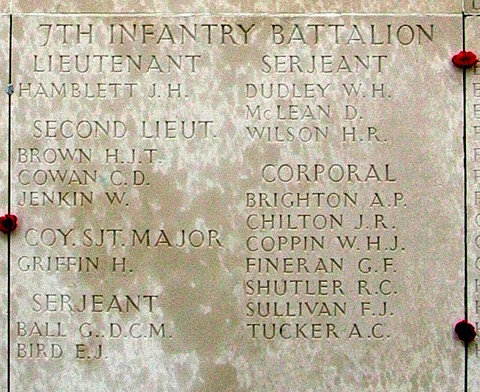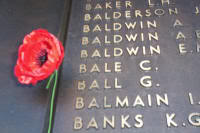George Ball
| Born | 1894 |
|---|---|
| Place | St Petersburg, Russia |
| Ethnic origin | British |
| Religion | Church of England |
| Arrived at Australia |
from Antwerp, Belgium on 21.08.1911 per Seydlitz disembarked at Melbourne |
| Residence before enlistment | Rutherglen, Vic. |
| Occupation | Vigneron's clerk |
| Naturalisation | natural born British subject |
Service #1
| Service number | 881 |
|---|---|
| Enlisted | 18.08.1914 |
| Place of enlistment | Rutherglen, Vic. |
| Unit | 7th Battalion |
| Rank | Private, Corporal, Sergeant |
| Place | Gallipoli, 1915; Western Front, 1916 |
| Casualties | WIA 1915 |
| Awards | DCM (14.01.16 LG); MID (28.01.16 LG); Bar to DCM (14.11.16 LG) |
| Final fate | KIA 5.11.1916 |
| Memorial | 26 Villers-Bretonnuex, France |
Materials
Digitised service records (NAA)
Digitised Embarkation roll entry (AWM)
Digitised recommendation for awards 1 2 3 (AWM)
Digitised Roll of Honour circular (AWM)
Jamieson, W., 'Ball, George', in Australian Dictionary of Biography, vol. 7, Melbourne, MUP, 1979, p. 160.
R. McMullin, 'Such is glory: 7th Battalion at Lone Pine', Wartime, no. 11, 2000, pp.44-47.
Blog article
Newspaper articles
Farewell to the Rutherglen volunteers, Rutherglen Sun and Chiltern Valley Advertiser, 21 August 1914, p. 2
Local soldier wounded, Rutherglen Sun and Chiltern Valley Advertiser, 11 May 1915, p. 2
Our heroes at the front. Letters to friends, Rutherglen Sun and Chiltern Valley Advertiser, 11 June 1915, p. 2
Letters from the front, Rutherglen Sun and Chiltern Valley Advertiser, 21 December 1915, p. 3
Distinguished Conduct Medal, Rutherglen Sun and Chiltern Valley Advertiser, 28 April 1916, p. 2
Late G. Ball, Rutherglen Sun and Chiltern Valley Advertiser, 11 May 1917, p. 2
Notice: A rule to administer the Estate, Rutherglen Sun and Chiltern Valley Advertiser, 12 March 1918
In Memoriam, Rutherglen Sun and Chiltern Valley Advertiser, 24 September 1918, p. 2
In Memoriam, Rutherglen Sun and Chiltern Valley Advertiser, 12 November 1918, p. 2
From Russian Anzacs in Australian History:
The very first contingent [...] -- this First Fleet of the new Australian nationhood -- left Australian waters in early November 1914 with at least 12 Russians: the Finns Baer and Hiltunen, the ethnic Russians Arn, Kamishansky, Sast and Sindeeff, the Polish-born Markowicz and Watson, the Jews Zander and Levene, and the Russian-born Englishmen Ball and Dyson.
[...] George Ball (7th Battalion), a Russianised Englishman from St Petersburg, became a Gallipoli hero [...]. A month after being wounded during the landing at Gaba Tepe, he rejoined his battalion. On 6 August, at the battle for Lone Pine, he won a DCM (Distinguished Conduct Medal) for 'conspicuous gallantry' and was promoted to corporal -- when the officers and NCOs in his party had all been killed or wounded, according to his citation he 'took command ... in an isolated post, and held the enemy in check until reorganization had been effected'. At Lone Pine, one of the most glorious battles in the history of the 7th Battalion, Lieut. W.J. Symons, Ball's company commander, had '150 men and four officers' under his command; afterwards, 'All but 9 were dead or wounded'. Four of them, including Symons, received the Victoria Cross.
[...] Comrades of the Russian Gallipoli hero George Ball remembered him during that break from the fighting [in Egypt]: 'Off duty at Mena Camp, one would most likely find him a formidable contestant at the boxing stadium or trying his luck at crown and anchor (to do which he'd raffle the mandolin when broke and buy it back on hitting the jackpot). Long ere the great test came, "the Russian" had been accepted as a nice bloke, one with whom you'd hate to pick a row.'
[...] [At the Western Front] fearless George Ball, the Lone Pine hero, took part in a successful raid on enemy trenches along this northern Belgian sector, for which he was awarded a bar to his DCM and promoted to sergeant. In the citation for Ball's new award his commander wrote: 'At Hollebeke on the night of the 30 September 1916 during a silent raid on the enemy's trench No 881 Acting Sergeant George Ball D.C.M. showed conspicuous gallantry. He was the N.C.O. of the left party, and after entering the enemy's trench - came to a dugout where he saw two Germans. He ordered them out - one obeyed, but when he was out he fired his revolver at Sergeant Ball, who jumped inside and shot him, and then shot the other in the dugout. Processing along the trench he encountered a German in a recess and killed him. Further along the trench he saw another small dugout and flashing his torch he saw four Germans. One came out and showed fight, and was shot by Sgt Ball. A bomb was thrown into the dugout and groans were heard.' There was no place for mercy here; it was kill or be killed ... A few weeks later, at Gueudecourt during the new push on the Somme, Ball himself will be killed by a shell.
Gallery

Villers-Bretonneux memorial panel

AWM memorial panel 49
 Russian Anzacs
Russian Anzacs